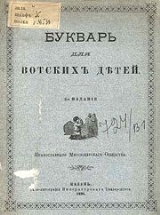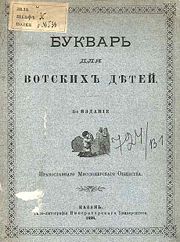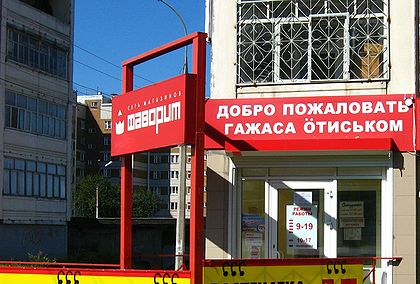
Udmurt language
Encyclopedia
Udmurt is an Uralic language, part of the Permic
subgroup, spoken by the Udmurt
natives of the Russian constituent republic of Udmurtia
, where it is coofficial with Russian
. It is written in the Cyrillic script with five additional characters. Together with Komi
and Komi-Permyak
languages, it constitutes the Permic grouping. Among outsiders, it has traditionally been referred to by its Russian exonym, Votyak. Udmurt has borrowed vocabulary from the neighboring languages Tatar and Russian.
Ethnologue
estimates 550,000 mother tongue speakers (77%) out of an ethnic population of 750,000 in the former USSR (1989 census).
is based on the Russian
Cyrillic alphabet:
Udmurt alphabet
Four of these characters are unique to the Udmurt alphabet.
.
 Udmurt is an agglutinating language. It uses affix
Udmurt is an agglutinating language. It uses affix
es to express possession, to specify mode, time, and so on.
s. Many loanwords are from the Tatar language
, which has also strongly influenced Udmurt phonology and syntax. Words related to technology, science and politics have been borrowed from Russian
.

Permic languages
Permic languages are a branch of the Uralic language family. They are spoken in the foothills of the Ural Mountains of Russia.* Komi** Komi-Permyak** Komi-Yodzyak ** Komi-Zyryan...
subgroup, spoken by the Udmurt
Udmurt people
The Udmurts are a people who speak the Udmurt language. Through history they have been known in Russian as Chud Otyatskaya , Otyaks, or Votyaks , and in Tatar as Ar....
natives of the Russian constituent republic of Udmurtia
Udmurtia
The Udmurt Republic , or Udmurtia is a federal subject of Russia . Its capital is the city of Izhevsk. Population: -History:...
, where it is coofficial with Russian
Russian language
Russian is a Slavic language used primarily in Russia, Belarus, Uzbekistan, Kazakhstan, Tajikistan and Kyrgyzstan. It is an unofficial but widely spoken language in Ukraine, Moldova, Latvia, Turkmenistan and Estonia and, to a lesser extent, the other countries that were once constituent republics...
. It is written in the Cyrillic script with five additional characters. Together with Komi
Komi language
The Komi language is a Finno-Permic language spoken by the Komi peoples in the northeastern European part of Russia. Komi is one of the two members of the Permic subgroup of the Finno-Ugric branch...
and Komi-Permyak
Komi-Permyak language
Komi-Permyak language is one of two regional varieties of the pluricentrical Komi language, the other variety being Komi-Zyrian.Komi is a Uralic language closely related to Udmurt....
languages, it constitutes the Permic grouping. Among outsiders, it has traditionally been referred to by its Russian exonym, Votyak. Udmurt has borrowed vocabulary from the neighboring languages Tatar and Russian.
Ethnologue
Ethnologue
Ethnologue: Languages of the World is a web and print publication of SIL International , a Christian linguistic service organization, which studies lesser-known languages, to provide the speakers with Bibles in their native language and support their efforts in language development.The Ethnologue...
estimates 550,000 mother tongue speakers (77%) out of an ethnic population of 750,000 in the former USSR (1989 census).
Alphabet
The Udmurt alphabetAlphabet
An alphabet is a standard set of letters—basic written symbols or graphemes—each of which represents a phoneme in a spoken language, either as it exists now or as it was in the past. There are other systems, such as logographies, in which each character represents a word, morpheme, or semantic...
is based on the Russian
Russian language
Russian is a Slavic language used primarily in Russia, Belarus, Uzbekistan, Kazakhstan, Tajikistan and Kyrgyzstan. It is an unofficial but widely spoken language in Ukraine, Moldova, Latvia, Turkmenistan and Estonia and, to a lesser extent, the other countries that were once constituent republics...
Cyrillic alphabet:
Udmurt alphabet
| Uppercase | Lowercase | Transliteration | IPA | Letter name |
| A | a | a | [ɑ] | а |
| Б | б | b | [b] | бэ |
| В | в | v | [v] | вэ |
| Г | г | g | [g] | гэ |
| Д | д | d | [d]; palatal [dʲ] when followed by я, е, и, ё, ю or ь | дэ |
| Е | е | e | [je]; [ʲe] when preceded by д, т, з, с, л, or н | е |
| Ë | ë | ë | [jo]; [ʲo] when preceded by д, т, з, с, л, or н | ё |
| Ж | ж | ž | [ʒ] | жэ |
| Ӝ | ӝ | dž | [dʒ] | ӝэ |
| З | з | z | [z]; palatal [ʑ] when followed by я, е, и, ё, ю or ь | зэ |
| Ӟ | ӟ | dʑ | [dʲʑ] | ӟe |
| И | и | i | [i]; [ʲi] when preceded by д, т, з, с, л, or н | и |
| Ӥ | ӥ | ï | [i] | точкаен и, точкаосын и ("dotted i") |
| Й | й | j | [j] | вакчи и ("short i") |
| К | к | k | [k] | ка |
| Л | л | l | [ɫ]; palatal [lʲ] when followed by я, е, и, ё, ю or ь | эл |
| М | м | m | [m] | эм |
| Н | н | n | [n]; palatal [nʲ] when followed by я, е, и, ё, ю or ь | эн |
| О | о | o | [o] | o |
| Ӧ | ӧ | ö | [ʌ] ~ [ə] | ӧ |
| П | п | p | [p] | пэ |
| Р | р | r | [r] | эр |
| С | с | s | [s]; palatal [ɕ] when followed by я, е, и, ё, ю or ь | эс |
| Т | т | t | [t]; palatal [tʲ] when followed by я, е, и, ё, ю or ь | тэ |
| У | у | u | [u] | у |
| Ф1 | ф | f | [f] | эф |
| Х1 | х | x | [x] | ха |
| Ц1 | ц | c | [t͡s] | цэ |
| Ч | ч | č | [t͡ɕ] | чэ |
| Ӵ | ӵ | tʲč | [t͡ʃ] | ӵэ |
| Ш | ш | š | [ʃ] | ша |
| Щ1 | щ | šč | [ɕ], [ɕː] | ща |
| Ъ2 | ъ | – | чурыт пус ("hard sign") | |
| Ы | ы | y | [ɨ] ~ [ɯ] | ы |
| Ь | ь | ' | [ʲ] | небыт пус ("soft sign") |
| Э | э | è | [e] | э |
| Ю | ю | ju | [ju]; [ʲu] when preceded by д, т, з, с, л, or н | ю |
| Я | я | ja | [jɑ]; [ʲa] when preceded by д, т, з, с, л, or н | я |
- 1 Only used in Russian loanwords and names.
- 2 Silent, but required to distinguish palatalized consonants (/dʲ tʲ zʲ sʲ lʲ n/) from unpalatalized consonants followed by /j/ if followed by a vowel; for example, /zʲo/ and /zjo/ are written -зё- and -зъё-, respectively.
Four of these characters are unique to the Udmurt alphabet.
Phonology
The language does not distinguish between long and short vowels and does not have vowel harmonyVowel harmony
Vowel harmony is a type of long-distance assimilatory phonological process involving vowels that occurs in some languages. In languages with vowel harmony, there are constraints on which vowels may be found near each other....
.
Grammar

Affix
An affix is a morpheme that is attached to a word stem to form a new word. Affixes may be derivational, like English -ness and pre-, or inflectional, like English plural -s and past tense -ed. They are bound morphemes by definition; prefixes and suffixes may be separable affixes...
es to express possession, to specify mode, time, and so on.
Lexicon
Based on the style, about 10 to 30 percent of the Udmurt lexicon consists of loanwordLoanword
A loanword is a word borrowed from a donor language and incorporated into a recipient language. By contrast, a calque or loan translation is a related concept where the meaning or idiom is borrowed rather than the lexical item itself. The word loanword is itself a calque of the German Lehnwort,...
s. Many loanwords are from the Tatar language
Tatar language
The Tatar language , or more specifically Kazan Tatar, is a Turkic language spoken by the Tatars of historical Kazan Khanate, including modern Tatarstan and Bashkiria...
, which has also strongly influenced Udmurt phonology and syntax. Words related to technology, science and politics have been borrowed from Russian
Russian language
Russian is a Slavic language used primarily in Russia, Belarus, Uzbekistan, Kazakhstan, Tajikistan and Kyrgyzstan. It is an unofficial but widely spoken language in Ukraine, Moldova, Latvia, Turkmenistan and Estonia and, to a lesser extent, the other countries that were once constituent republics...
.

External links
- Udmurtology: Udmurt Language, History and Culture
- Literature
- The First Udmurt Forum
- Udmurt State University (has Udmurt Language Program for English speakers)
- Udmurt language, alphabet and pronunciation
- Uralistica – the world of finno-ugric and samoyed peoples
- Vladimir NapolskikhVladimir NapolskikhVladimir Vladimirovich Napolskikh — a Russian ethnographer, ethnologist, ethnohistorian, Finno-Ugrist, linguist. Doctor of Historical Sciences , Professor at Udmurt State University. Member of the «Societas Uralo-Altaica» since 2000....
. Review of Eberhard Winkler, Udmurt, München 2001 (Languages of the World. Materials 212)

